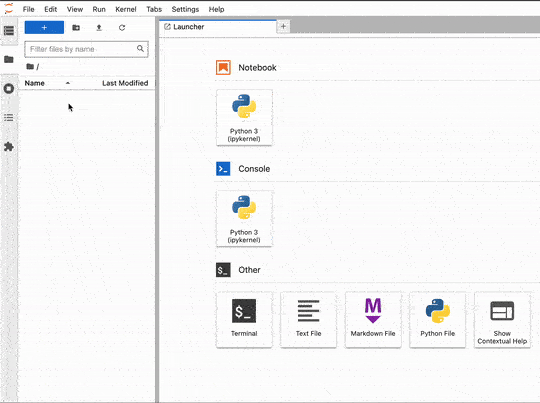JupyterLab extension for browsing Minio object storage.
This extension is composed of a Python package named jupyterlab-minio.
This extension works on JupyterLab 3 only.
To install:
pip install jupyterlab-minioYou may also need to run:
jupyter server extension enable jupyterlab-minioto make sure the server extension is enabled. Then, restart (stop and start) JupyterLab.
If you have a ~/.mc/config.json file, no further configuration is necessary.
To configure using environment variables, set:
export MINIO_ENDPOINT="https://s3.us.cloud-object-storage.appdomain.cloud"
export MINIO_ACCESS_KEY="my-access-key-id"
export MINIO_SECRET_KEY="secret"Alternatively, you can start without any configuration and fill in your endpoint and credentials through the form when prompted.
Note: You will need NodeJS to build the extension package.
The jlpm command is JupyterLab's pinned version of yarn, but you may also use yarn or npm as an alternative.
To install the development environment:
# Clone the repository and navigate to the project folder
git clone https://github.com/aristide/jupyterlab-minio.git
cd jupyterlab-minio
# Set up a virtual environment
virtualenv .venv
source .venv/bin/activate
# Install required packages for development
pip install jupyter_packaging~=0.10
# Install the package in development mode
pip install -e .
# Link the development version of the extension with JupyterLab
jupyter labextension develop . --overwrite
# Enable the server extension manually in development mode
jupyter server extension enable jupyterlab-minio
# Build the extension TypeScript source files
jlpm buildTo continuously watch the source directory and rebuild the extension on changes, run:
# Watch the source directory in one terminal
jlpm watch
# In another terminal, run JupyterLab in debug mode
jupyter lab --debugTo ensure source maps are generated for easier debugging:
jupyter lab build --minimize=False# Disable the server extension in development mode
jupyter server extension disable jupyterlab-minio
# Uninstall the package
pip uninstall jupyterlab-minioIn development mode, you may also need to remove the symlink created by jupyter labextension develop. To find its location, use jupyter labextension list to locate the labextensions folder, then remove the jupyterlab-minio symlink within it.
To install test dependencies and execute server tests:
pip install -e ".[test]"
jupyter labextension develop . --overwrite
pytest -vv -r ap --cov jupyterlab-minioTo execute frontend tests using Jest:
jlpm
jlpm testThis extension uses Playwright with the JupyterLab helper Galata for integration tests.
Refer to the ui-tests README for further details.
-
Install Docker: Ensure Docker is installed and running on your machine. You can download it from Docker's official site.
-
Install Visual Studio Code: Download and install Visual Studio Code.
-
Install the Remote - Containers Extension:
- In Visual Studio Code, go to the Extensions view (
Ctrl+Shift+XorCmd+Shift+Xon Mac). - Search for and install the "Remote - Containers" extension by Microsoft.
- In Visual Studio Code, go to the Extensions view (
-
Open the Project in a Devcontainer:
- Open the
jupyterlab-minioproject folder in Visual Studio Code. - You should see a prompt to reopen the folder in a devcontainer. Click "Reopen in Container." If you don’t see the prompt, use the Command Palette (
Ctrl+Shift+PorCmd+Shift+Pon Mac), type "Remote-Containers: Reopen in Container," and select it.
- Open the
-
Wait for the Container to Build:
- VS Code will build the devcontainer using the
.devcontainer/Dockerfileor.devcontainer/devcontainer.jsonconfiguration. This setup may take a few minutes as it installs dependencies and configures the environment.
- VS Code will build the devcontainer using the
-
Access the Development Environment:
- Once the container is running, you can access the terminal (
Ctrl+`` orCmd+``on Mac) and use the VS Code editor as usual. The devcontainer has all necessary tools pre-installed for working onjupyterlab-minio.
- Once the container is running, you can access the terminal (
-
Run the Extension:
- To run and test the extension in JupyterLab, use the development commands from above, such as
jlpm watchandjupyter lab --debug --ServerApp.token='' --ip=0.0.0.0 --notebook-dir=notebooks.
- To run and test the extension in JupyterLab, use the development commands from above, such as
This setup allows you to develop in a consistent, isolated environment that replicates the project dependencies and configurations, making collaboration easier.
